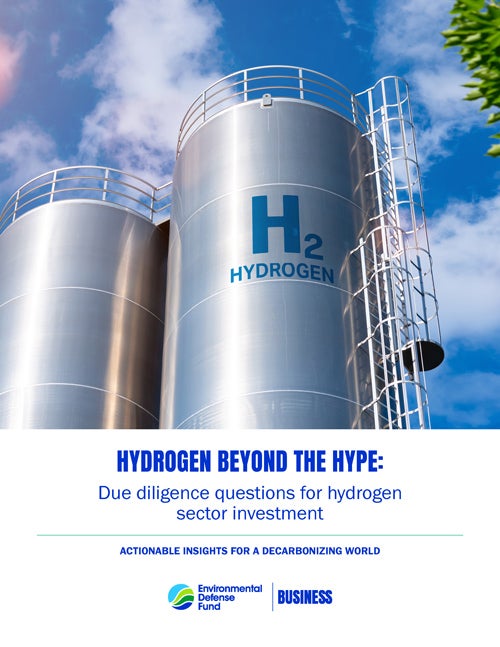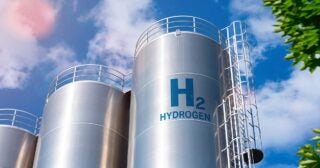- Resources
- Hydrogen beyond the hype: Due diligence questions for hydrogen sector investment
Resources
Hydrogen beyond the hype: Due diligence questions for hydrogen sector investment
Published: July 25, 2024 by EDF Staff
Over USD $500bn has been announced globally in hydrogen project investments – an inpouring of finance that reflects hydrogen’s promise to help decarbonize the global economy. However, while the hydrogen market presents opportunities for investors, it also carries risks. Being an early mover in a sector in which scientific, engineering and regulatory considerations continue to evolve requires extra care.
Only science-backed investment strategies targeting the appropriate production methods, management practices and applications for low-emissions hydrogen can unlock the molecule’s potential to decarbonize key sectors and generate durable returns.
Report highlights
- We have an opportunity to get hydrogen right – before new systems are built at scale globally. Now is the time to establish the practices needed to maximize hydrogen’s benefits for the climate, ecosystems, and human society, while minimizing its risks.
- Hydrogen should be used where it can cost-effectively reduce the most climate warming at the lowest possible risk. On a macro level, deployment of hydrogen as an energy carrier should be evaluated against non-hydrogen alternatives (e.g. electrification, efficiency, etc.) to guide limited resources to applications where hydrogen provides the greatest benefits.
- Hydrogen systems must be evaluated based on a full system-level assessment. Assessments should consider all climate-warming gases (i.e. methane, carbon dioxide, and hydrogen itself); climate-relevant timescales; and evolving scientific understanding and engineering considerations. Assessment should also include hydrogen’s potential risks and benefits, including air quality and ecosystem impacts, and economic and social factors on the local level and/or globally.
- Hydrogen systems should be designed to minimize emissions. Emissions and leakage of all climate-warming gases throughout the hydrogen value chain must be minimized to avoid the risk of compromising the intended climate benefits. Emissions performance needs to be monitored, reported, and verified.
In this report, we present guidelines for investors related to hydrogen investment – ranging from general guiding principles to specific questions about the production, management, transport, and end use of hydrogen.
Ultimately, coupling science with investment strategies can unlock the molecule’s potential to decarbonize key sectors and generate durable returns that create lasting value for people and the planet.
Hydrogen beyond the hype: Due diligence questions for hydrogen sector investment
The emerging hydrogen market presents opportunities and risks for investors. These key principles and due diligence questions offer a guide.

Additional resources


